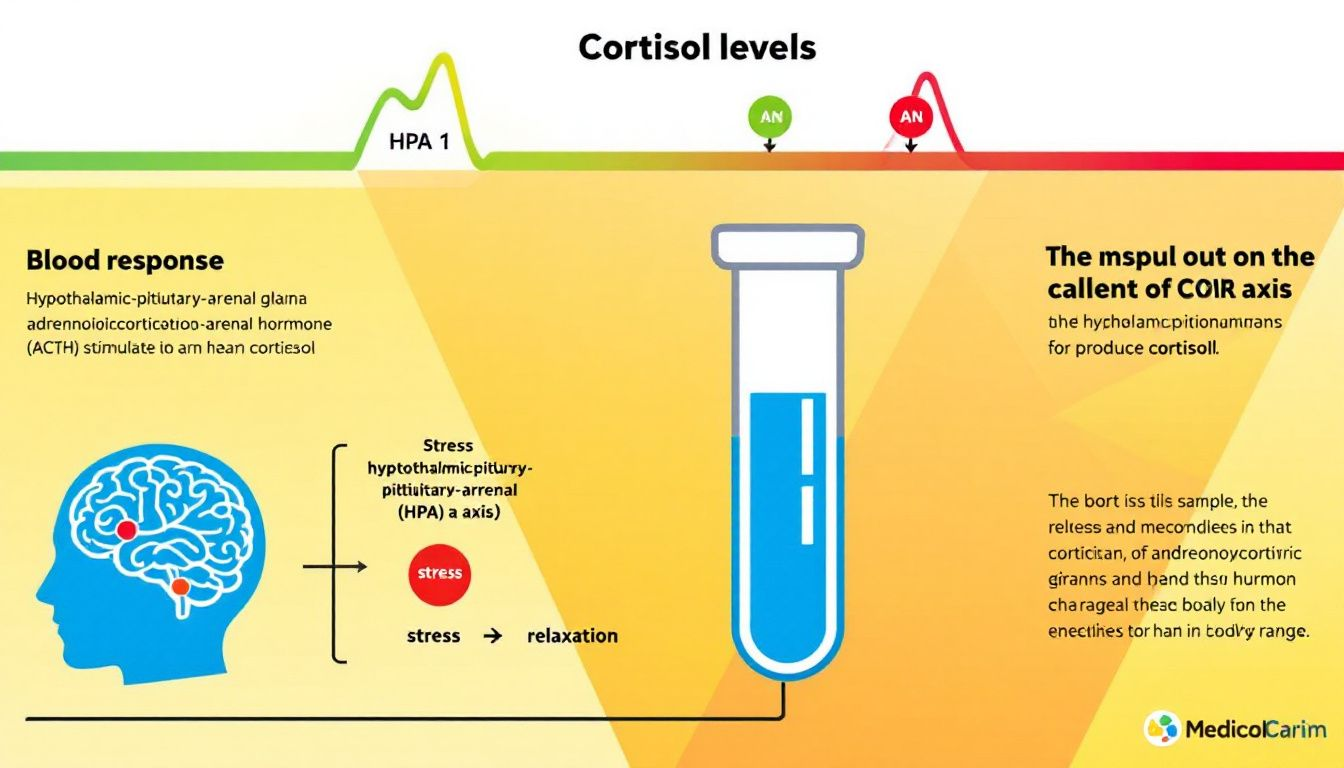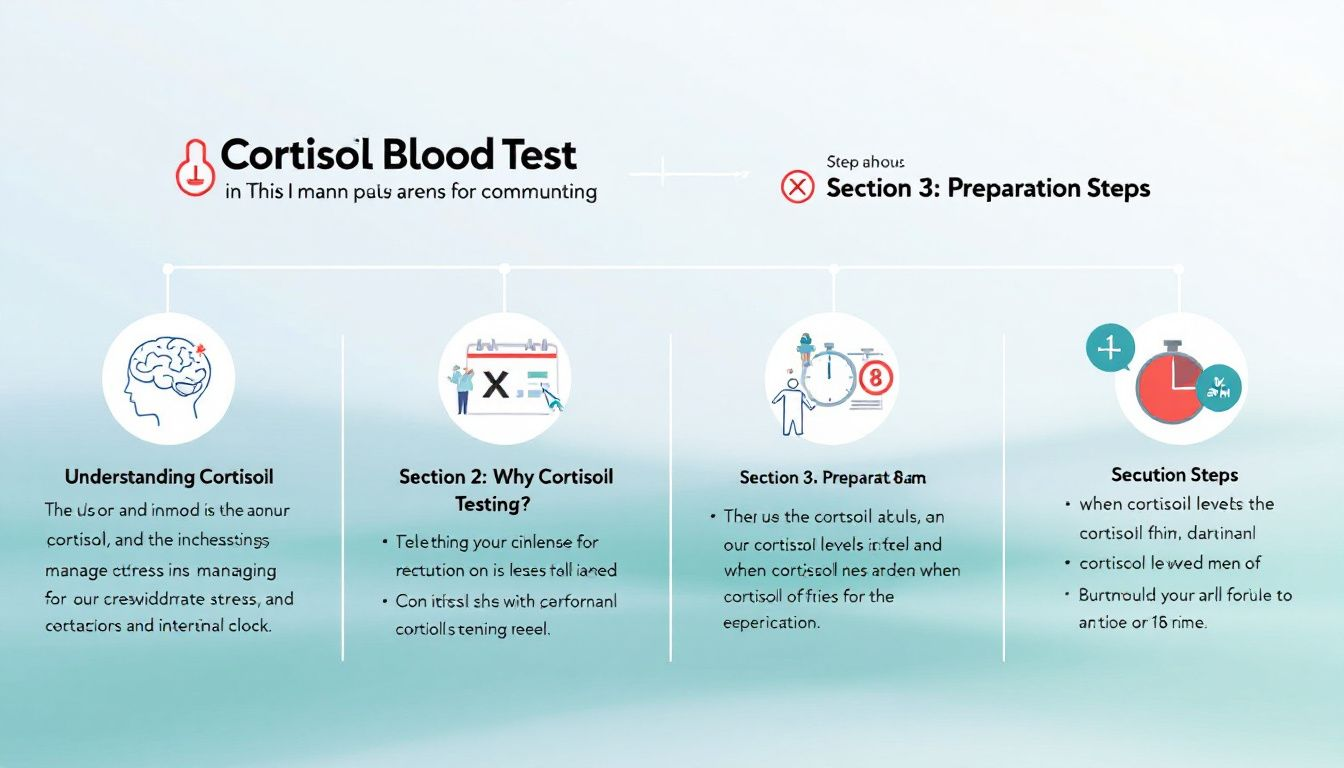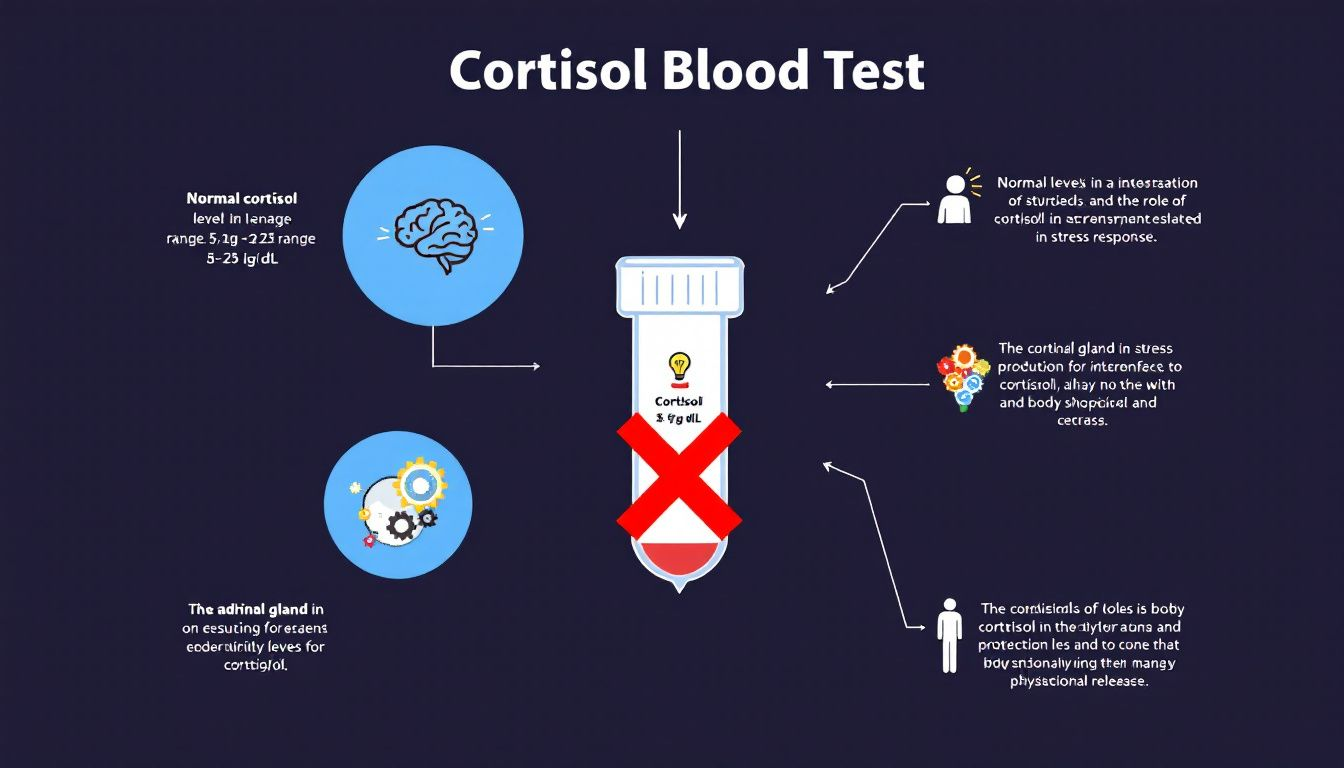A cortisol blood test measures the amount of cortisol, a stress hormone, in your blood. This stress hormone helps control stress, metabolism, and blood pressure. Knowing your cortisol levels can help diagnose conditions like Addison’s disease and Cushing’s syndrome. In this guide, you’ll learn what the cortisol blood test involves, how to prepare for it, and how to interpret your results. Also see Adrenal tests here.
Key Takeaways
Cortisol test measures cortisol levels, which are crucial for diagnosing adrenal gland conditions like Addison’s disease and Cushing’s syndrome.
Cortisol levels typically peak in the morning and fluctuate throughout the day, making morning testing essential for accuracy.
Abnormal cortisol levels necessitate further testing to diagnose underlying health issues, with lifestyle changes and medical treatments available for management.
Cortisol Blood Test: Guide to Understanding Results & Health Impacts

The cortisol blood test measures the levels of cortisol, a vital hormone produced by the adrenal glands. The pituitary gland produces adrenocorticotropic hormone (ACTH), which influences cortisol production in the adrenal glands. This hormone plays a significant role in various bodily functions, including stress response, blood pressure regulation, and metabolism. The cortisol test measures the blood cortisol levels and helps diagnose conditions such as Addison’s disease and Cushing’s syndrome by evaluating adrenal gland health.
Cortisol levels fluctuate throughout the day, typically peaking in the morning and declining by night. This daily rhythm is why it’s often recommended to schedule the test in the morning for the most accurate results. These fluctuations must be understood for accurate test result interpretation, providing insight into adrenal gland function.
Specialized tests, such as the dexamethasone suppression test and the Synacthen test, diagnose specific conditions. The dexamethasone suppression test identifies Cushing’s syndrome by measuring cortisol production changes after a dexamethasone dose. The Synacthen test assesses adrenal function by measuring cortisol response to synthetic ACTH, often used in suspected cases of Addison’s disease.
These blood tests, along with the cortisol tests and the cortisol blood test, offer a comprehensive view of adrenal health and overall stress response.
Introduction
Cortisol testing can be performed using blood, urine, or saliva test samples, each reflecting the varying levels of cortisol throughout the day. Saliva tests are another method of measuring cortisol levels, known for their accuracy and the straightforward procedure involved with saliva samples. Understanding these nuances is essential for accurate health assessments and diagnoses. This guide will delve into each aspect of cortisol testing, including the cortisol urine test, helping you interpret results and understand their implications for your health.
Cortisol is a vital hormone that influences numerous bodily functions, making its testing critical. From managing stress to regulating metabolism and immune response, cortisol’s role cannot be overstated. By the end of this guide, you’ll have a deeper understanding of how cortisol testing works, how to prepare for it, and what your results mean.
What is a Cortisol Blood Test?

A cortisol test measures the level of cortisol in your blood, providing insights into your adrenal gland health. This test is crucial for diagnosing conditions like Addison’s disease, characterized by decreased cortisol production, and Cushing’s syndrome, marked by excessively high levels of cortisol.
Cortisol levels naturally fluctuate throughout the day, peaking in the morning and gradually declining by night. This daily rhythm, known as the circadian rhythm, is why it’s recommended to schedule the test in the morning. Conditions such as Addison’s disease or hypopituitarism can lead to decreased cortisol levels, while conditions like Cushing’s syndrome can cause elevated levels.
There are specialized tests like the ACTH stimulation test and the dexamethasone suppression test that provide additional insights. The ACTH stimulation test measures cortisol levels after administering synthetic ACTH to evaluate adrenal gland response. The dexamethasone suppression test involves administering dexamethasone to see if cortisol production decreases, which can help diagnose Cushing’s syndrome. These tests complement the cortisol blood test by providing a more detailed picture of adrenal function.
How to Prepare for a Cortisol Blood Test

Preparation is key to ensuring accurate cortisol test results. Follow any pre-test instructions from your healthcare provider, which may include adjusting your medication and activity levels. Vigorous exercise and certain medications can influence cortisol levels and should be avoided before the test.
Let your doctor know about any atypical sleep schedules, as sleep patterns can significantly affect cortisol levels. Adhering to these guidelines ensures that your test results accurately reflect your body’s cortisol levels.
Taking the Cortisol Blood Test
A healthcare professional will draw a blood sample, typically from a vein in your arm, for the cortisol blood test. You might feel a brief stinging sensation during the blood draw, but the process is generally quick and straightforward, taking less than five minutes.
Knowing what to expect during the blood draw can alleviate any anxiety about the procedure. The process is simple and quick, allowing you to return to your day knowing you’ve taken a crucial step towards understanding your health and the importance of blood samples.
Interpreting Cortisol Blood Test Results

Interpreting cortisol blood test results involves understanding whether your cortisol levels are within the normal range or if they indicate potential health issues. Results are based on specific reference ranges that help determine if your levels are normal, elevated, or low, which can be crucial for diagnosing conditions like Cushing’s syndrome or Addison’s disease.
Normal Cortisol Levels
Normal cortisol levels in a morning blood test range from 5 to 25 mcg/dL. A blood sample taken at 8 a.m. should normally show levels within this normal ranges, reflecting the body’s natural circadian rhythm.
Cortisol levels fluctuate throughout the day, peaking in the morning and declining by evening. This daily fluctuation is essential for interpreting results correctly and understanding your body’s natural cortisol level hormone cycles.
High Cortisol Levels
High cortisol levels can indicate conditions such as Cushing’s syndrome, characterized by symptoms like weight gain, high blood pressure, and mood swings. Elevated cortisol levels can lead to too much cortisol, significantly impacting your overall health and leading to various complications if left untreated.
Recognizing the symptoms of high cortisol levels, such as rapid weight gain and skin changes, can prompt timely medical intervention and management.
Low Cortisol Levels
Low cortisol levels are often associated with Addison’s disease, which can result in symptoms like chronic fatigue, muscle weakness, and low blood pressure. Insufficient cortisol production can significantly impair your body’s ability to manage stress and maintain essential functions.
Recognizing the symptoms and understanding the implications of low cortisol levels can help you seek appropriate medical care and manage the condition effectively.
Follow-Up Tests After Abnormal Results
Abnormal cortisol test results often necessitate further testing to confirm a diagnosis and identify the underlying cause. Additional tests, such as imaging studies or hormone tests, may be required to provide a comprehensive evaluation.
For instance, the dexamethasone suppression test can help distinguish between Cushing’s syndrome and stress-related cortisol elevation, while imaging studies can identify abnormalities in the pituitary gland and adrenal glands.
Factors Affecting Cortisol Levels
Factors such as physical and emotional stress, lifestyle choices, and sleep patterns can influence cortisol levels. Acute stress significantly triggers cortisol release, emphasizing the hormone’s role in stress adaptation.
Alcohol consumption, smoking, and dietary habits can also significantly impact cortisol levels. Knowing these factors can help manage and maintain balanced cortisol levels.
Importance of Cortisol in the Body

Cortisol plays a crucial role in managing blood pressure by regulating the balance of salts and water in the body. It also helps maintain stable blood sugar levels, ensuring that enough glucose is available for energy.
Cortisol supports the nervous system by aiding in the body’s fight-or-flight response as a stress hormone, enhancing alertness and energy during stressful situations. It also contributes to various critical bodily functions, including metabolism regulation and immune defense.
Managing Abnormal Cortisol Levels
Managing abnormal cortisol levels involves a combination of medical treatment and lifestyle changes. Incorporating relaxation techniques, such as mindfulness and deep breathing, can help lower cortisol levels. Establishing strong social connections can also reduce cortisol levels by releasing oxytocin, which counteracts cortisol production.
A nutritious diet rich in whole foods and low in sugar and saturated fats is associated with lower cortisol levels. Regular physical activity, aiming for at least 150 minutes a week, is another effective strategy for managing cortisol levels. Prioritizing good sleep hygiene and maintaining a consistent sleep schedule can significantly help regulate cortisol levels.
Limiting or avoiding alcohol, tobacco, and caffeine can also help maintain balanced cortisol levels. Changing negative thought patterns and reducing stress can further contribute to healthier cortisol levels.
Summary
In summary, understanding and managing cortisol levels is crucial for maintaining overall health. From preparing for a cortisol blood test to interpreting results and managing abnormal levels, this guide has provided comprehensive insights into each step of the process.
By following the advice and strategies outlined, you can take control of your cortisol levels and, consequently, your health. Recognizing the importance of cortisol and how it affects your body is the first step towards achieving a balanced and healthy life.
Frequently Asked Questions
What is a cortisol blood test?
A cortisol blood test assesses cortisol levels in the blood, which aids in evaluating adrenal gland function and diagnosing disorders such as Addison’s disease and Cushing’s syndrome. It is an important tool for understanding your health.
How should I prepare for a cortisol blood test?
To prepare for a cortisol blood test, avoid vigorous exercise and inform your doctor about any atypical sleep patterns or medications you are taking. Adhering to these guidelines will help ensure accurate results.
What do high cortisol levels indicate?
High cortisol levels can indicate conditions such as Cushing’s syndrome, which is associated with symptoms like weight gain, high blood pressure, and mood swings. Monitoring cortisol levels is essential for identifying these health issues.
What are the symptoms of low cortisol levels?
Symptoms of low cortisol levels, typically linked to Addison’s disease, include chronic fatigue, muscle weakness, and low blood pressure. If you experience these symptoms, it is advisable to consult a healthcare professional for assessment and management.
What follow-up tests might be needed after abnormal cortisol results?
Follow-up tests may include imaging studies, additional hormone assessments, and specialized evaluations, such as the dexamethasone suppression test, to confirm the diagnosis and determine the underlying cause.
